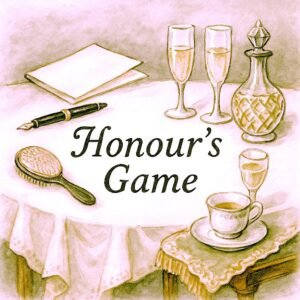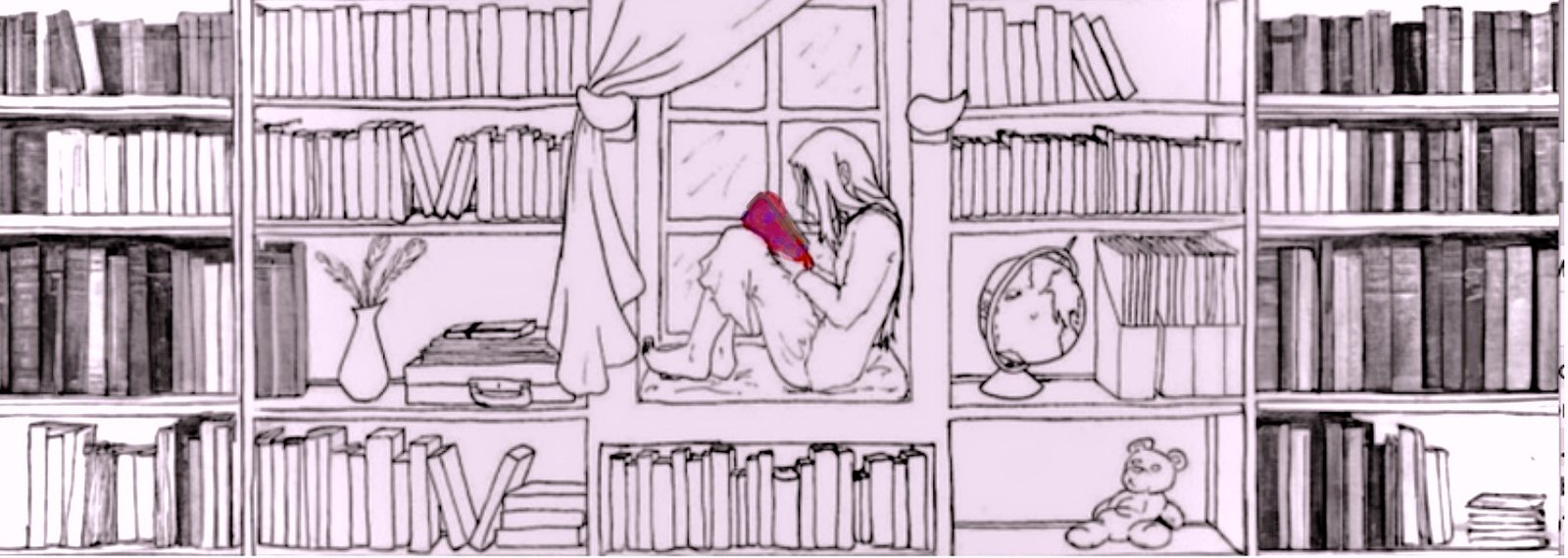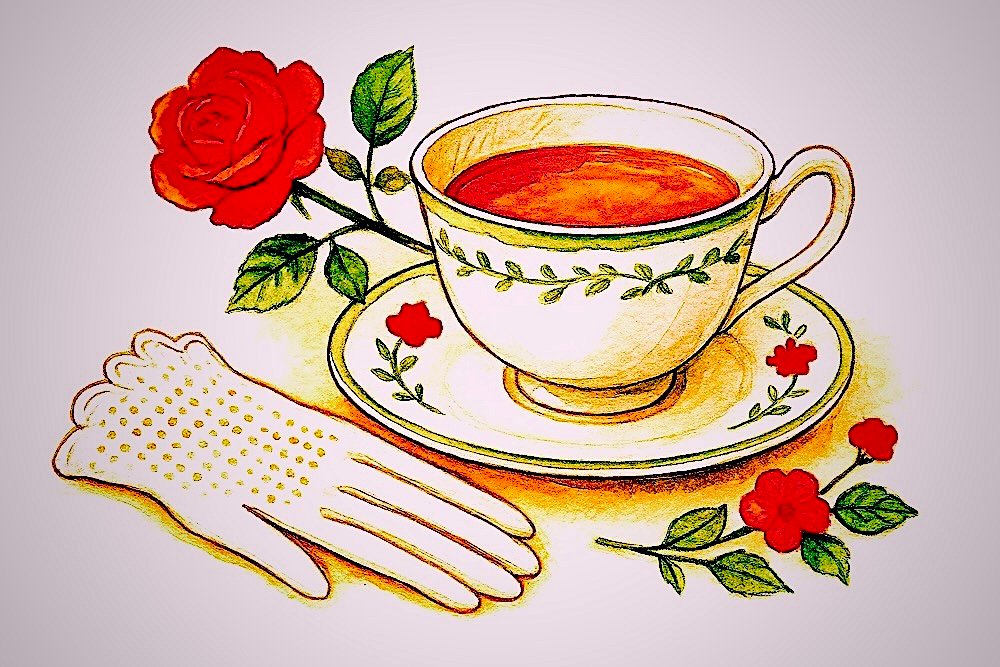0 comment(s) so far. Please add yours!
The story of Inez de Vries’s experiences in the summer of 1955 unfolds through a series of documents – some official, pulled from the prim and unforgiving files of Saint Clare’s School for Girls; others are more intimate, drawn from the journals, letters, and scribbled notes of the girls themselves. Some will appear typed and orderly; others will retain the texture of handwriting, rendered in a cursive-style font. Readers are invited to step into the role of archivist, assembling the story from these traces, and imagining the lives that fill the gaps between pages – the tensions, the alliances, the secrets too dangerous to write down. Not everything will be explained.
 But Inez is watching. And she remembers.
But Inez is watching. And she remembers.
This story goes back to 1938 and tells the story of Inez’s parents, especially Lady Gwendolyn “Honour” deVries, a St. Clare Old Girl who notices far more than most people realize.
Note: Comments are read and much appreciated. Much as I like reading them on Twitter and Bluesky, I love getting them here and promise to respond. Moreover your responses and ideas are included in the archives and may shift and change the story’s evolution.
Having trouble with the handwriting? Try the plain text version.
Introduction
 This tale follows Honour’s Lesson, where Lady Gwendolyn Randolph de Vries — Honour — first tested the patience of her new husband, Edmund Alexander de Vries, 9th Earl of Darlington. Like that earlier story, it begins in a more traditional narrative mode, borrowing the cadence of Regency romance. Yet here a new element enters: the reports of a bride still half a schoolgirl, too quick with her laughter, too eager for her husband’s notice, and learning how his sternness might be turned into intimacy. What she believes to be a private game of observation will, in time, shape far more than she imagines.
This tale follows Honour’s Lesson, where Lady Gwendolyn Randolph de Vries — Honour — first tested the patience of her new husband, Edmund Alexander de Vries, 9th Earl of Darlington. Like that earlier story, it begins in a more traditional narrative mode, borrowing the cadence of Regency romance. Yet here a new element enters: the reports of a bride still half a schoolgirl, too quick with her laughter, too eager for her husband’s notice, and learning how his sternness might be turned into intimacy. What she believes to be a private game of observation will, in time, shape far more than she imagines.
Though not set at Saint Clare’s, its themes are familiar: discipline, secrecy, defiance — threads that are woven through the school itself.
From The Archivist:
From the Lady de Vries Collection, Blue Room Archives, Saint Clare’s School for Girls)
The papers presented here form part of what is now known as the Lady de Vries Collection. Though the correspondence was originally preserved among the private files of her husband, Edmund Alexander de Vries, 9th Earl of Darlington, its preservation and eventual deposit at Saint Clare’s are due to Lady Gwendolyn Randolph de Vries herself.
The exchange of initials — D. and H. — occurs throughout. Their precise origins are unclear; however, internal evidence suggests that these letters were both a private correspondence between husband and wife and, increasingly, a record of informal “exercises” undertaken by Lady de Vries during the late 1930s.
The editors have retained the original orthography and punctuation. A few later pencil notes in Lord Darlington’s hand are reproduced in grey type. Where the line between affection and assignment blurs, readers are invited to remember that the world beyond these pages was also shifting — toward war, secrecy, and a very different kind of education.
Part One
If you haven’t read the Prologue yet, you should.
Note from D. –
11 November 1938
Honour,
You are attending Lady Fenton’s gathering tomorrow. Treat it as exercise.
 – Sit where you are seen, not where you are heard.
– Sit where you are seen, not where you are heard.
– One glass of champagne, no more.
– Listen more than you speak. Note what is certain, and what you only suppose.
– Write it after, neatly, as if for school.
Report due upon return, as soon as possible. Marks for observation, not embroidery. Late submissions will not be entertained, .
D.
From Honour’s Diary
13 November 1938
I cannot remember when I last enjoyed myself so much. Not the tea itself — stale biscuits, foolish talk drifting as the chill through sunlit windows, and champagne poured as though it were lemonade — but the after. To wake and see his hand in the margin, sharp as any schoolmaster’s, yet mine to keep, mine to read again and again.
It is as though I have been given new eyes. I look, I listen, I write, and then he writes too — not cold, not displeased, not turning from me, but answering. His pencil is exact, and still I find it a kindness. He thinks I may be good at this. He will not say it, but I see it between his corrections. And how I thrill to it — I make him write.
And when I stood before his desk, my paper laid on the blotter, he bent his head and marked it with his pencil while I waited, hardly daring to breathe. I felt again the old flutter of school, the nervous desire to please, the fear of not making the mark — and then the relief, the dizzy pleasure when the mark was made and it was not failure. He did not look at me, only at the page. Yet I felt seen, and more than seen.
How strange, that I should have lines once more, only these lines are the world itself. It feels like school, and yet not school, for he can make me feel a schoolgirl and his wife at the same time. I want only to please. I am giddy, foolish, happy. He is not frowning now. He is watching, and I am learning, and I cannot wait for him to set my next exercise. I shall be his most apt student!
From DeVries’s Private Files:
 Honour’s Report:
Honour’s Report:
12 November 1938
To: D.
From: H.
Occasion: Tea at Lady Fenton’s drawing-room, Belgravia. Cold sunshine through tall windows, curtains not yet drawn. Champagne circulated as though it were lemonade, though the biscuits were stale.
Method:
Sat demurely, appeared subdued (though only a little). Accepted a single glass and nursed it all afternoon. Laughed, but not too loudly.
Observations:
– Lord Fenton repeats that his sister has “gone Bolshevik” because she wants to marry a doctor.
– Mrs. P., after two glasses of sherry, confided that her brother-in-law had written to Germany for car parts during the Sudeten crisis. (She says they are cheaper there. I do not believe she sees the implication.)
– A minor attaché with an excellent moustache declared he would wager fifty guineas Chamberlain returns with “peace in our time” again by Christmas. No one took the bet.
– The older ladies watched me as though I were bound to spill champagne down my front. I did not oblige them.
Assessment:
Perhaps they are right to look; I nearly slipped once, and then remembered you at your desk, frowning. But see, Darlington — I can sit, smile, listen, and not bring the ceiling down. I wrote it all here, as you asked.
Postscript:
It feels like a school exercise, but I find I like it. Your stern pencil has replaced your coldness, and I am glad. Forgive me my mischief — and let me keep my new game.
Yours
H.

Ned’s Margin Notes, in pencil
– Tone improved. Controlled without stiffness.
– Noted Mrs. P.’s German correspondence — small detail, but dangerous if repeated. Well caught.
– Attaché’s wager: levity may mask intent. Always note specifics (sum, season).
– The older ladies’ scrutiny: not useless. They see more than you think.
– Your restraint pleased me. See how little is lost when you are measured.
– Continue. Next time, attend more to who listens when others speak.
Honour’s Private Journal
15 November 1938
(Not to be shown. Burn if ever found.)
Not the tea itself — stale biscuits, foolish talk drifting as the chill through sunlit windows, and champagne poured as though it were lemonade — but the after. To wake and see his pencil hand in the margin, not cold, not displeased, but answering. His voice that evening was warm again, his eyes soft, and I could breathe.
It is absurd, how proud I felt. Like a schoolgirl with full marks, or a child praised for clean gloves. Yet I find I like it — this game of observation, his exact notes, my little triumphs.
Already I am impatient for the next assignment.
Tonight, when he brushed my cheek with his fingers, I thought: I wished to be his Honour forever, and perhaps I may yet succeed.

